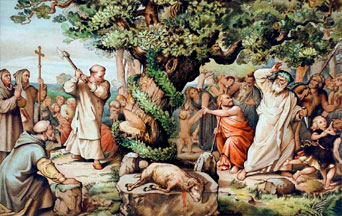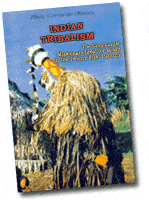
Does the Amazon Synod represent the “Amazonization” of the Church?
Imagine the consequences for civilization and the world’s progress if Saint Remigius would have told Clovis, King of the Franks in 496: “There’s no need to burn the gods you worship because they represent immemorial values of the original culture of your people.”
Or if Saint Boniface, the apostle of what would become Germany, had not burned before the Germanic people the giant oak tree they worshiped because hiding in it were forces in harmony with nature that should be respected.
Even worse, imagine that Saints Peter and Paul, upon arriving in Rome, had said that the household Roman gods Manes, Lares and Penates represented ancestral cultural values that should not be lost.
Had the early apostles done so, later missionaries traveling with Hernan Cortes would have followed their example. Instead of washing the blood off the pyramid of human sacrifices, they would have found in those bellicose Indians some highly recoverable aspects of the “seeds of the Word.”
For their part, Pizarro’s companions would have considered that the Incas should not abandon their customs and receive the Gospel. Instead, they would have sought out the teaching of those Indians, which was so full of innate wisdom.
Had all that happened, there would have been neither civilization nor Christendom. Today we would be nomadic peoples mired in backwardness, barbarism and a long stagnation spanning centuries.
This hypothesis is so absurd that it is even hard to imagine it being possible.
Why Integral Ecology Will Destroy Civilization
However, the recently released Instrumentum Laboris (IL) or Working Document for the Synod on the Amazon holds positions very similar to those imagined above.
It is impregnated with an outdated vision of Rousseau’s “noble savage.” It sees the Indians in general and Amazon tribes in particular as peoples untouched by the corruption of the West. We must learn from them, rather than they from us.
Let us see some of its statements:
On evangelization, the Working Document argues that, “The original peoples of the Amazon have much to teach us. We recognize that for thousands of years they have taken care of their land, water and forest, and have managed to preserve them until today so that humanity can benefit from enjoying God’s free gifts of creation. The new paths of evangelization must be built in dialogue with the ancestral wisdom in which the seeds of the Word become manifest.”
The tribal communal life in communion with the environment is the kind of civilization to which the IL seems to aspire: “The life of Amazon communities not yet influenced by Western civilization is reflected in the beliefs and rites regarding the actions of spirits, of the many-named divinity acting with and in the territory, with and in relation to nature. This worldview is captured in the ‘mantra’ of Francis: ‘everything is connected.’” Note that “the many-named divinity” refers to the general pantheistic vision of those tribes, for whom God is confused with all things visible and with the earth, which Pacific tribes call “Pachamama.”
 Learn All About the Prophecies of Our Lady of Good Success About Our Times
Learn All About the Prophecies of Our Lady of Good Success About Our Times
However, for the IL’s editors, this reality is characterized by “[t]he unique diversity of the Amazon region – biological, religious and cultural – [which] suggests a new Pentecost,” “a paradigm, a hope for the world.”
Naturally, if admiration for Amazon tribal life means “a new Pentecost,” civilization and progress represent the “old man” from which Saint Paul says we must free ourselves: “Accelerating urbanization and expanding agriculture carried out by agribusinesses plus the abuse of natural assets … add to the major grievances mentioned earlier.”
Note that the document puts urbanization and agriculture on the same level as the “grievances” of abusing natural assets. This gives the impression that all that must end, as it “provokes a crisis of hope.”
The IL editors’ euphoric enthusiasm for this type of tribal life leads them to present it as a lesson for the Church and the world: “It is a great opportunity for the Church to discover the incarnate and active presence of God: in the most diverse manifestations of creation; in the spirituality of original peoples; in the expressions of popular religiosity; in the different popular organizations that resist the mega-projects; and in the proposal of an economy of solidarity, productive and sustainable, that respects nature.”
These Are the Destructive Goals of the Pan-Amazon Synod
The expressions employed by the Synod’s Working Document condemn any “mega-projects” without distinction, and praise those “popular organizations that resist” progress as examples to imitate. This condemnation of any development of mining for progress and profit is in sync with the speeches of the extreme left of Latin America.

The Working Document presents the divine mandate “Going, therefore, teach ye all nations,” from a “dialoguing” angle. However “recognizing other avenues / pathways that seek to decipher the inexhaustible mystery of God. Insincere openness to the other, just like a corporatist attitude, that reserve salvation exclusively for one’s own creed, are destructive of that very creed.”
In other words, Revelation and the message of salvation that Our Divine Redeemer taught us is only one of the many ways “to decipher the inexhaustible mystery of God.” Clinging to Him in a “corporatist”—read Catholic—attitude is “destructive of that very creed,” that is, Catholicism. This completely upends the entire mission that the Church carried out in her twenty centuries of apostolate.
Notes on the Unacceptable Philosophy and Theology of Laudato Si’
These samples from the Working Document are enough to show that all the centuries-old fruits of civilization and progress can be undermined, and return us to a situation like that imagined at the beginning of this commentary:
“Do not burn what you adore,” fiery Sicambrian Frank. Let us dialogue instead!
More articles related to the upcoming Synod on the Amazon may be found on Pan-Amazon Synod Watch, at https://panamazonsynodwatch.com/.
